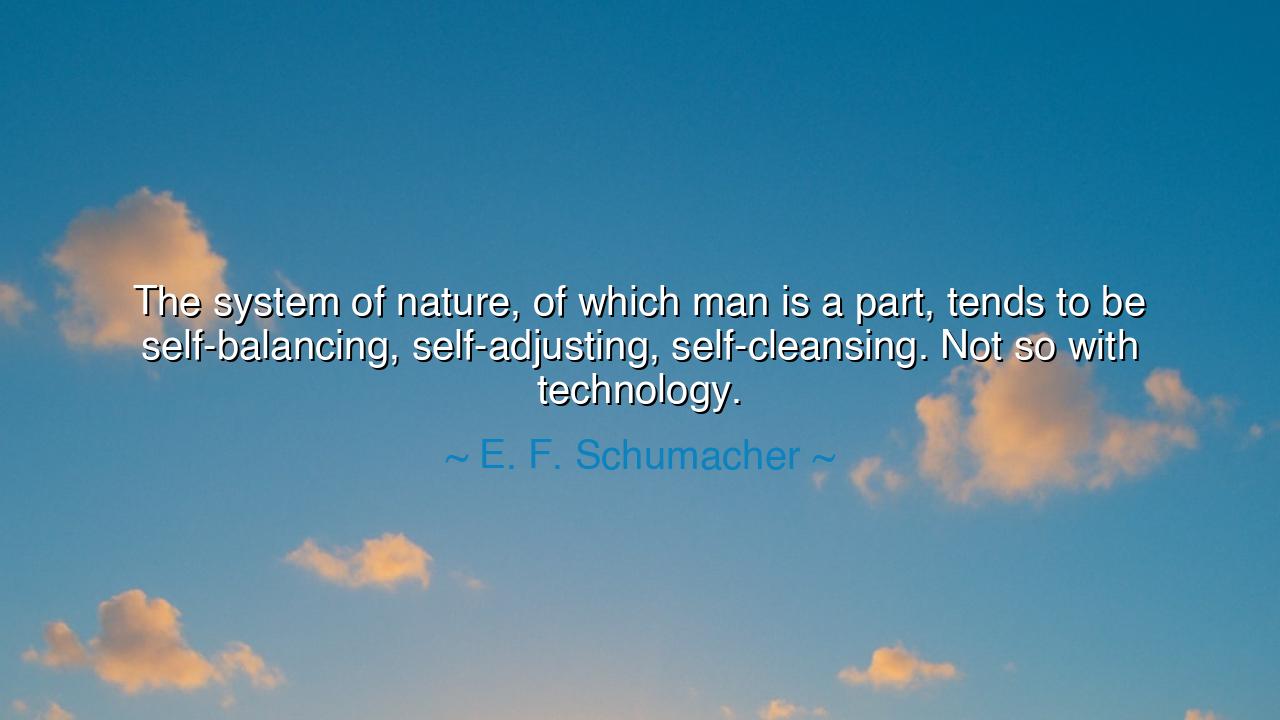
The system of nature, of which man is a part, tends to be
The system of nature, of which man is a part, tends to be self-balancing, self-adjusting, self-cleansing. Not so with technology.






Hear the solemn wisdom of E. F. Schumacher, who looked upon the modern age with clear eyes and said: “The system of nature, of which man is a part, tends to be self-balancing, self-adjusting, self-cleansing. Not so with technology.” In this contrast, he spoke of the eternal difference between the living order of the earth and the restless creations of man. For nature is a great circle, endlessly renewing itself, while human invention often breaks the circle and forgets the harmony of which it is a part.
The system of nature has endured since the beginning of time. Forests grow, die, and feed the soil for new growth. Rivers flood, cleanse, and carve new paths, giving life to the land. Predators and prey keep each other in balance, ensuring that no species overwhelms the whole. Even the decay of the fallen becomes food for the living. It is a dance of balance, a cycle of death and renewal, a wisdom greater than any human mind.
But when man builds with technology, this harmony is often lost. A machine produces waste that the earth cannot absorb, poisons that linger in the air, the water, and the soil. A factory draws resources without returning them, breaking the cycles of renewal. Unlike the forest, it does not self-cleanse; unlike the river, it does not self-adjust. Instead, its products accumulate, its errors spread, and its consequences demand constant management. Here lies Schumacher’s warning: nature heals itself, but technology rarely does.
History gives us sobering examples. Consider the Industrial Revolution, when coal smoke blackened the skies of London. The city grew rich, but the air grew foul, choking the lungs of its people. Nature could not cleanse the air as quickly as machines polluted it, and the balance was broken. Or think of the Chernobyl disaster, when a nuclear reactor unleashed poison into the land. Decades later, the forest has slowly reclaimed the zone, but not because of the wisdom of technology—because humanity withdrew and nature’s system began its slow healing.
Yet let us not despise technology. For it has lifted burdens, cured diseases, and connected the world. The danger is not in invention itself, but in the arrogance that forgets its limits. When humans build as though they are separate from nature, they create systems that spiral out of balance. But when they study the patterns of nature—its cycles, its resilience, its wisdom—and shape technology in harmony with these, then invention becomes not a destroyer, but a partner.
The lesson, O seeker, is this: trust in the wisdom of nature’s cycles, and do not imagine that human tools can escape them. Let your technologies be designed to self-balance, to return what they take, to cleanse what they produce, to renew what they consume. Learn from the forest, the river, the soil. For if your creations do not reflect nature’s wisdom, they will require endless labor to repair, and they may yet destroy the very ground upon which you stand.
Practical steps follow: choose technologies that are sustainable, that give back as they take. Support innovations in clean energy, in recycling, in regenerative farming. Live in such a way that your tools serve harmony, not disruption. And above all, remain humble before the earth, for its wisdom is older than ours, and its balance more enduring.
Thus, remember Schumacher’s words: “The system of nature… tends to be self-balancing… Not so with technology.” This is not a call to abandon invention, but to temper it with reverence. For only when human creations bow to the eternal cycles of the earth will they endure without turning upon their makers.






AAdministratorAdministrator
Welcome, honored guests. Please leave a comment, we will respond soon